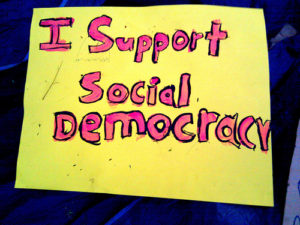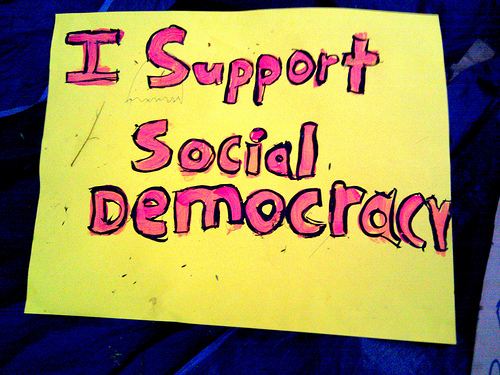 If you browse discussion threads or engaged in bar room banter long enough, invariably a bleeding heart who advocates socialist policies (namely wealth redistribution), will point to the curious cases of the Scandinavian countries and bleat that Socialism works.
If you browse discussion threads or engaged in bar room banter long enough, invariably a bleeding heart who advocates socialist policies (namely wealth redistribution), will point to the curious cases of the Scandinavian countries and bleat that Socialism works.
Wiser heads prevail and point to Soviet era Communist Russia, Cultural Revolution era Communist China, Contemporary Communist Cuba, the socialist dystopia of Venezuela right now and point out that Socialism does not work very well.
So – how do we deal with these contradictions?
Starting with the Scandinavian countries – a key thread is small populations, low corruption and excellent education.
Notably, Venezuela, Norway and Saudi Arabia each have extensive fossil fuel resources, but vastly different outcomes.
Saudi Arabia channels its revenue to a vast royal family, and significant funds to the export of violent ideology to the world through its spread of Wahhabi Islam. The general population do not really have an excellent education nor standard of life.
Norway channels its revenue to a future fund, treating fossil fuel revenues as an unsustainable bonus. A protestant work ethic is prevalent – (Protestants developed an asceticism and a sense of religious duty that valorised and promoted work for the sake of economic gain). This allows it to justify a balanced budget and to implement a social contract with high taxes, low unemployment, excellent civil services and a high level of education. Notably, the variances between high and low income is low.
Venezuela is a text book example of socialists gaining power based on promising everything to the people, but through corruption and ineptitude, they lose the ability to generate the revenues that fund the exorbitant spending that they promised. A Catholic nation, they then force businesses to operate at a loss under threat of violence, which of course is an unsustainable short term measure, and every subsequent response is a deepening cycle of short term solutions implemented under threat of violence, creating ever worsening outcomes. This is why many consider actual implementation of social utopias as likely to deliver socialist dystopia.
Now, across the world there are many variations, but so many economies can be placed into the Saudi Arabia, Venezuela or Norway bucket – regardless of the resources they have.
Most of the Islamic world, regardless of natural resources, are prone to kleptocracy and suppression of education. They sit in the Saudi Arabia category.
Southern Europe, Central and South America fall into the Venezuela category – high corruption, mediocre education, large promises from government, but ever worsening outcomes. This is one of the socialist examples that those who decry socialism instinctively refer to.
Scandinavia, Northern Europe, Canada, NZ and Australia fall into the Norway category – low corruption, an expectation for extensive government services and a high quality education system. Recent history has seen these economies sponsor progressive values, tolerance, secularism – and of late, cultural suicide via mass migration. Primarily because the other two categories create such misery they flock to these countries – drawn by the embrace of the social contract which offers so many great things.
In this latter category, the concern for many pragmatists is that the system is broken, straining by a quarter of a century of ineffective politicians. Uncontrolled migration and the associated pressures on education levels and religious inspired violence are concerns of pragmatists.
The western socialists seek to tolerate the worst of socialism and expect the best of outcomes – and this idealism is part of what they call progress. All those who oppose their ideals, very often the pragmatists and realists, are considered to be on the wrong side of history, politically incorrect fascists etc.
Our idealists adore the innovations of companies like Apple – for that we can be grateful as it means there is still hope. They abhor tax avoidance (minimialisation) of such companies, which is understandable. They believe that if the taxes were collected and handed out to “the needy”, there would be plenty for everybody (which is naive – not to omit the fact that capitalism lifts hundreds of millions of people out of poverty every decade), and they never mention that corrupt socialism simply does not innovate and it does not create wealth – it simply crushes innovations and hands out ever smaller wealth to an ever smaller inner circle.
Does socialism make the Scandinavian countries great? There is a strong argument that low corruption and a Protestant work ethic have enabled these countries to provide a social contract which was tenuously sustainable in the latter part of the twentieth century. To this end, we could refer to it as pragmatic socialism.
Unfortunatley, Cultural Marxism, nanny statism, politically correct ideology and mass migration terminally endanger the system which has drawn all the above to it. Crucially, capitalist economic realities, specifically international competitiveness, are made worse by the fact that the parasites that have attached to these countries make it harder for them to meet the ever more demanding needs of the parasite.
Simply put, all “socialist economies” are not equal.
Photo by G A R N E T 










